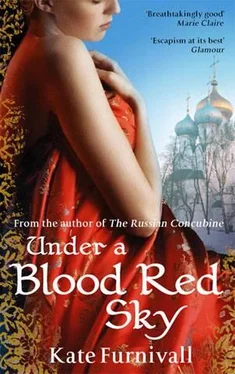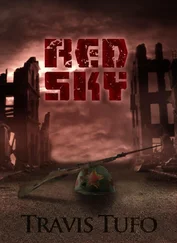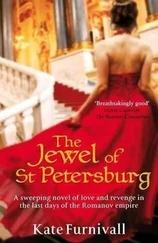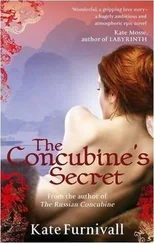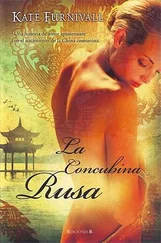‘“Maria,” I breathed, “it’s me.”
‘A tremor ran through the silent figure, then tears started to slide down her cheeks.
‘“My Anna,” she sobbed, and the fingers of one hand clawed at the air to draw me to her chair.
‘I clasped my arms around her neck, while she touched my wet hair and murmured soft words against my cold skin.
‘“Why didn’t you come?” I whispered the words. “I waited for you.”
‘Maria placed a shaky hand over her eyes. “I couldn’t.”
‘“Why didn’t you write?”
‘“Aunt Maria had a stroke.” It was Sasha’s voice. I had forgotten he was even still in the room. “It happened when she was tortured.”
‘My thoughts beat panicked wings in my head. White hair? Maria could not be more than forty. Why white hair? Her eyes were still beautiful, still luminous brown, but over them hung a veil, gossamer-fine, and behind it lay a world of bafflement and confusion. And she hadn’t risen to her feet to greet me. It all made agonising sense.
‘“Oh Maria, my poor dearest Maria. Why didn’t you ask your brother Sergei to write to me? I’d have come…”
‘Maria’s eyebrows gathered in a lopsided frown and she murmured, “Hush.” She glanced quickly in Sasha’s direction and then back again to my face. “It’s not important.”
‘“Of course it’s important. I would have taken care of-”
‘“No, no, not you, Anna Fedorina,” Sasha interrupted roughly. “My parents would never have written to you or wanted you in this house.” He stood with his hands on his hips and his chin jutting forward. “Aunt Maria suffered the stroke when she was tortured on account of her connection with your family, with you and your father and your father’s friends. I grew up on the story of how her hair turned white overnight in the prison cells. Your father was declared a Class Enemy and-”
‘“Shut up!” I shouted.
‘“Leave us, Sasha,” Maria moaned. “Please.”
‘He glared at me for a long moment before marching out of the room, slamming the door behind him. Quiet settled after that. Maria dismissed my apologies for what she’d suffered, so instead I kissed her, told her I loved her and would take care of her now that I had found her again. I made us tea from the samovar in the corner of the cramped room, then I pulled up a stool and told tales of my long years in Kazan. As the daylight started to fade from the room, I risked the question that burned inside me.
‘“Did you ever hear what happened to Vasily?”
‘Maria laughed, soft and low like in the old days. “How you worshipped that boy! You used to trail round after him like a little shadow. Do you recall how you used to make him dance with you? Or maybe you’ve forgotten that.”
‘“No, I haven’t forgotten.”
‘“And he adored you.” She chuckled again. “He came looking for you, you know.”
‘“When? When did he come?”
‘“I’m not sure, I can’t… Think, stupid brain, think.” Maria rapped her knuckles against her own forehead. “I forget everything now.”
‘I stroked the skin soothingly. “It’s all right, there’s no rush. Take your time. Can you remember what he looked like?”
‘The crooked mouth smiled its crooked smile. “Oh yes, he was tall. Grown into a man.”
‘“And still as handsome?”
‘“Yes, still as handsome. He came twice and told me he’d changed his name for safety.”
‘“To what?”
‘Again the look of bewilderment.
‘“Did you tell him where I was, Maria?”
‘“No, my love, I’m sorry. I couldn’t remember where you were.”
‘“Was he… disappointed?”
‘“Oh yes. That’s why he came twice. To see if I had remembered.” Tears filled her eyes. “But I couldn’t.”
‘I hugged her close and whispered without hope, “Where is he living now?”
‘To my surprise Maria nodded. “He wrote it down.”
‘From a large battered canvas bag that lay at her feet she withdrew a bible, its cover well-worn to a faded black. Tucked inside its pages was a scrap of grey envelope and on it printed in black letters: Mikhail Pashin, Levitsky Factory, Dagorsk. Home: Tivil Village, near Dagorsk. But just as I was holding the piece of paper in my hand, the door to the room crashed open and uniforms marched into the small space, their leather boots and broad shoulders swallowing up the air around us. Five stern faces turned on me. Behind them, with the sternest face of all, stood eleven-year-old Sasha.
‘“Anna Fedorina?” The officer had a black Cossack moustache that seemed to bristle and threaten, but his eyes were calm. “You are Anna Fedorina, daughter of Doktor Nikolai Fedorin who has been declared an Enemy of the People.”
‘“But that was years ago.”
‘The officer gave me a smile that was not a smile. “We don’t forget. Or forgive.”
‘Strong hands seized my arms and dragged me off my feet.
‘“Anna!” Maria screamed, with all the power of her frail lungs, her one good hand clawing the air again. “Let me kiss her, let me kiss my Anna goodbye.”
The soldiers hesitated, then thrust me at Maria’s chair. Maria clamped her arm fiercely round my neck and buried her face in my hair, kissing my cheek, my jaw, my ear, all the time whispering, whispering, whispering. So that when the rough hands stole me from Maria’s grasp, I was aware of nothing but those words:
‘“His mother’s jewels. In a box. He’s buried them in the church under St Peter’s feet. He told me. In the village where he lives.”’
‘Where are you going, Comrade Morozova?’
Sofia had risen to her feet in the conference hall. She couldn’t bear it inside this hothouse of lies and paranoia a moment longer. All the promises of quotas impossible to achieve, and the incessant ranting against wreckers and saboteurs – it set off a griping pain in her stomach, as though rats were chewing in there.
Alanya Sirova’s expression was poised halfway between curiosity and suspicion. ‘Are you leaving?’
‘ Da. Yes, I have work to do.’
‘But I thought-’
‘While Comrade Direktor Pashin and Comrade Boriskin are away reporting to the Committee,’ Sofia tossed her pad and pen on the lap of Alanya’s navy blue suit, ‘I want you to take notes of everything that goes on here.’
The secretary’s cheeks glowed pink with pleasure. ‘ Spasibo , comrade. I won’t let you down, I promise.’
It made Sofia want to cry.
The streets of Leningrad had changed. As Sofia walked their pavements she began to wish she hadn’t come back. The tall pastel-painted houses with ornate window frames and wrought iron balconies, houses she had once thought so smart and elegant, had been transformed into sooty drab buildings crammed full of sooty drab people who scurried to the bread queues and the candle queues and the kerosene queues, where they waited for hours like sheep in a slaughter house. Their clothes were shabby and their chins tucked tight to their chests. Against the cool breeze that skimmed off the canals? Or against the expression in other people’s eyes? Suspicion was so strong in the air, she could smell it.
As she hurried down Nevsky the trams rattled past her, packed with grey empty faces. The new factories pumped a thick filth into the air that settled like widows’ weeds over the buildings. When Sofia leaned eagerly over the bridge, as she had as a child to catch sight of the Fontanka, the stench that drifted up from it caught at her throat and made her eyes water. What were they dumping in there?
She was here to search out the apartment where Anna had lived briefly with Maria and Irina, but had no exact address to go on. She walked fast along the bank of the Neva, over the little humpback Gorbatiy Mostik and then turned left across Liteiny Bridge. Once in the Liteiny district she set about combing the spider’s web of streets with their dismal tenements, but it took her an hour to find it. The tap factory. It was still there.
Читать дальше
